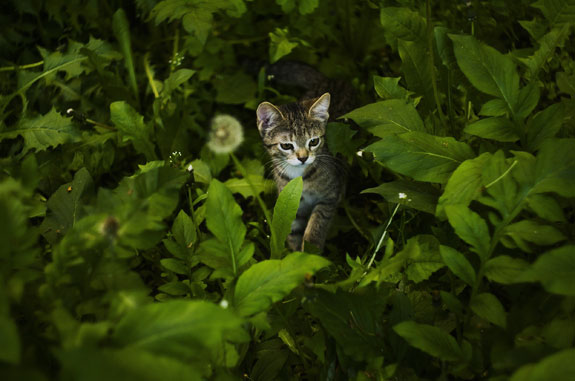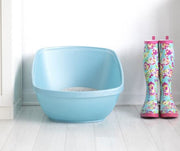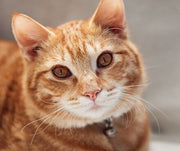How To Choose the Best Cat Collar

Do cats need collars?
The simple answer is yes.
Whether or not your feline friend is still a kitten or a full-grown cat, chances are a collar will serve its purpose, and it will help you out in more ways than one.
First off, you are going to want to narrow down the reasons and the purpose as to why you think your cat needs a collar. Sometimes, it's for the sake of accessorizing, but for most owners, they consider the identity, safety, and security of their pets. Luckily for us, the technology available in the market today offers us a variety of options when it comes to choosing the best cat collar.
Here are some factors that you should consider when picking out the right collar for your cat:
COLLAR FIT
It's important to consider the length and size of the collar. Most owners think that any sort will do, and while that's not necessarily untrue, it's advisable to make sure that your cat is comfortable. Your cat should not have a hard time breathing and moving, and the fit should not be too snug. Many responsible owners make sure that they have a two-finger allowance when examining the fit of collars.
It also helps to understand that cats have a natural tendency to wander around, whether or not we're able to keep an eye on them. This means that there's a chance they may get caught up in fences, tree branches, or even bushes. To ensure your pet's safety, consider a collar with a breakaway buckle that enables your cat to get out of these sticky situations. The Petmate Adjustable Breakaway Cat Collar is a good example of such a collar.
SAFETY PURPOSES
Assuming you've been living with a cat for a few months or years, you're probably accustomed to your pet's daily activities and routine. If your cat is strictly an indoor cat, reflective cat collars might not be necessary. However, if your cat likes to wander, particularly during nighttime hours, you may want to consider a reflective collar that sports safety without sacrificing the comfort for your pet.
There are cases of cat deaths caused by unwary motorists, which is why collars with reflective features make it easy for drivers to spot them from a distance. Of course, we recommend that you keep your cat indoors as much as possible.
HABITAT

Some owners may have gardens in which birds are more than welcome. Our cats can have some unusual appetite patterns, and keeping this in mind, you may want to consider a collar with a removable bell. Since cats are hunters and tend to bring some of their prey home, a bell helps to alert potential prey and helps avoid unwanted "company" on your doorstep.
NECESSITY
Some cats have special needs compared to others, such as flea problems. Luckily, there are flea collars available on the market. It is important to note that some cats can have reverse reactions to these collars. While there are certain home remedies and special combs made to counter fleas, it helps to be aware of the advantages and disadvantages of anti-flea collars. It's always best to consult your veterinarian before starting any course of treatment.
PREFERENCE
While not as practical as the aforementioned reasons, accessorizing your cat is a valid reason for picking out a collar! Collars can be a reflection of your cat's personality as well as an indicator of identity and ownership.
If you're a first-time cat owner, chances are your might encounter difficulty when trying to place a collar on your kitten. To make things easier for you, make sure that you have already checked and ensured that the collar you purchased will fit your cat's neck, and will serve its purpose. The last thing you want to encounter is losing your kitten's collar, simply because it was too loose. Before putting it on your cat, it also helps to have some treats ready as a reward for your kitty for cooperating. Once you have already wrapped the collar around your pet's neck, try and be sensitive to any form of reactions, and check to see if there are hairs being pulled.
Collaring your cat does require patience. Depending on your cat, it can take days, weeks, and even months before your kitten and the collar co-exist. Just be mindful of the needs and purposes of the collar and continue to monitor your cat for any significant changes. Whatever your preferences, your cat's safety and comfort should be paramount. At the end of the day, choosing a collar will be entirely up to you and your cat's needs.
Previous article

Next article

Related posts
View all-

What Can You Use Instead of Cat Litter?
Traditional cat litter is convenient, but it’s not the only option. Many cat owners look for alternatives to reduce waste, save money, or avoid chemicals found in clay-based kitty litter. Some options offer better odor control, while others are more eco-friendly or gentler on a cat’s paws.
Read Article -

How to Keep My Backyard Smelling Fresh
A clean backyard should smell fresh, unlike pet waste, smoke, or mold. Bad smells can linger, especially when dog poop, urine, or food scraps attract flies and bacteria. If your yard has a foul odor, it's time to take action. The first step is cleaning up pet feces, trash, or rotting food. A garden hose can wash away dirt and urine from artificial turf, patios, and decks. To neutralize odor, Use baking soda, white vinegar, and essential oils.
Read Article -

What Supplies Do First-Time Cat Owners Need?
Bringing home a new cat is exciting, but making them feel safe and comfortable takes more than love. First-time cat owners must prepare with the right supplies to ensure a smooth transition. From a litter box to cat food and a warm bed, having the basics ready can help your new kitty settle in faster. This guide covers everything a new cat owner needs to make their new pet feel at home.
Read Article



